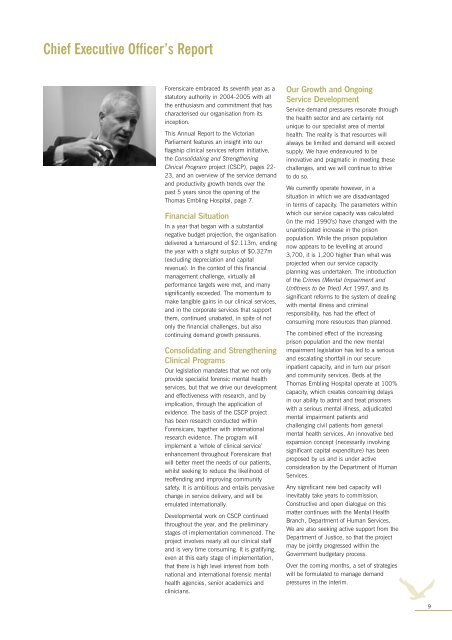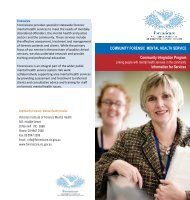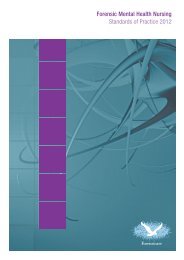Annual Report 2004-2005 - Forensicare
Annual Report 2004-2005 - Forensicare
Annual Report 2004-2005 - Forensicare
Create successful ePaper yourself
Turn your PDF publications into a flip-book with our unique Google optimized e-Paper software.
Chief Executive Officer’s <strong>Report</strong><br />
<strong>Forensicare</strong> embraced its seventh year as a<br />
statutory authority in <strong>2004</strong>-<strong>2005</strong> with all<br />
the enthusiasm and commitment that has<br />
characterised our organisation from its<br />
inception.<br />
This <strong>Annual</strong> <strong>Report</strong> to the Victorian<br />
Parliament features an insight into our<br />
flagship clinical services reform initiative,<br />
the Consolidating and Strengthening<br />
Clinical Program project (CSCP), pages 22-<br />
23, and an overview of the service demand<br />
and productivity growth trends over the<br />
past 5 years since the opening of the<br />
Thomas Embling Hospital, page 7.<br />
Financial Situation<br />
In a year that began with a substantial<br />
negative budget projection, the organisation<br />
delivered a turnaround of $2.113m, ending<br />
the year with a slight surplus of $0.327m<br />
(excluding depreciation and capital<br />
revenue). In the context of this financial<br />
management challenge, virtually all<br />
performance targets were met, and many<br />
significantly exceeded. The momentum to<br />
make tangible gains in our clinical services,<br />
and in the corporate services that support<br />
them, continued unabated, in spite of not<br />
only the financial challenges, but also<br />
continuing demand growth pressures.<br />
Consolidating and Strengthening<br />
Clinical Programs<br />
Our legislation mandates that we not only<br />
provide specialist forensic mental health<br />
services, but that we drive our development<br />
and effectiveness with research, and by<br />
implication, through the application of<br />
evidence. The basis of the CSCP project<br />
has been research conducted within<br />
<strong>Forensicare</strong>, together with international<br />
research evidence. The program will<br />
implement a ‘whole of clinical service’<br />
enhancement throughout <strong>Forensicare</strong> that<br />
will better meet the needs of our patients,<br />
whilst seeking to reduce the likelihood of<br />
reoffending and improving community<br />
safety. It is ambitious and entails pervasive<br />
change in service delivery, and will be<br />
emulated internationally.<br />
Developmental work on CSCP continued<br />
throughout the year, and the preliminary<br />
stages of implementation commenced. The<br />
project involves nearly all our clinical staff<br />
and is very time consuming. It is gratifying,<br />
even at this early stage of implementation,<br />
that there is high level interest from both<br />
national and international forensic mental<br />
health agencies, senior academics and<br />
clinicians.<br />
Our Growth and Ongoing<br />
Service Development<br />
Service demand pressures resonate through<br />
the health sector and are certainly not<br />
unique to our specialist area of mental<br />
health. The reality is that resources will<br />
always be limited and demand will exceed<br />
supply. We have endeavoured to be<br />
innovative and pragmatic in meeting these<br />
challenges, and we will continue to strive<br />
to do so.<br />
We currently operate however, in a<br />
situation in which we are disadvantaged<br />
in terms of capacity. The parameters within<br />
which our service capacity was calculated<br />
(in the mid 1990’s) have changed with the<br />
unanticipated increase in the prison<br />
population. While the prison population<br />
now appears to be levelling at around<br />
3,700, it is 1,200 higher than what was<br />
projected when our service capacity<br />
planning was undertaken. The introduction<br />
of the Crimes (Mental Impairment and<br />
Unfitness to be Tried) Act 1997, and its<br />
significant reforms to the system of dealing<br />
with mental illness and criminal<br />
responsibility, has had the effect of<br />
consuming more resources than planned.<br />
The combined effect of the increasing<br />
prison population and the new mental<br />
impairment legislation has led to a serious<br />
and escalating shortfall in our secure<br />
inpatient capacity, and in turn our prison<br />
and community services. Beds at the<br />
Thomas Embling Hospital operate at 100%<br />
capacity, which creates concerning delays<br />
in our ability to admit and treat prisoners<br />
with a serious mental illness, adjudicated<br />
mental impairment patients and<br />
challenging civil patients from general<br />
mental health services. An innovative bed<br />
expansion concept (necessarily involving<br />
significant capital expenditure) has been<br />
proposed by us and is under active<br />
consideration by the Department of Human<br />
Services.<br />
Any significant new bed capacity will<br />
inevitably take years to commission.<br />
Constructive and open dialogue on this<br />
matter continues with the Mental Health<br />
Branch, Department of Human Services.<br />
We are also seeking active support from the<br />
Department of Justice, so that the project<br />
may be jointly progressed within the<br />
Government budgetary process.<br />
Over the coming months, a set of strategies<br />
will be formulated to manage demand<br />
pressures in the interim.<br />
9














